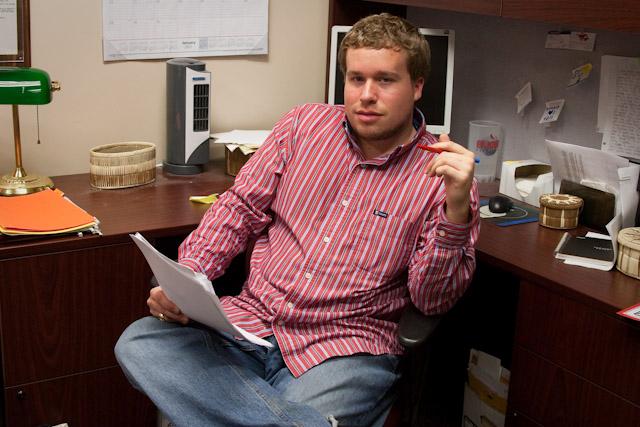
Matt Gayer sits in his office in Hughes-Trigg, where he works as executive director of Health Literacy Dallas. (Spencer J Eggers/ The Daily Campus)
More than 90 million Americans are affected by health illiteracy annually.
Health Literacy Dallas (HLD), an organization originally started through SMU Big iDeas funding, strives to help locals with issues of health communication.
“I was surprised to see that Dallas was not doing much about health literacy, and that’s why I initially wanted to do research on the issue,” Matthew Gayer, the organization’s executive director and founder, said.
However, Gayer quickly realized that one case study could not address all the problems in the Dallas area, especially in historically underrepresented West and South Dallas.
“The number one thing I tell all non-profit startups is to ask themselves if there is a true need for their products and services,” Gayer said. “Too many non-profits are redundant.”
Health Literacy Dallas works with both healthcare professionals and patients to improve communication between providers and recipients of healthcare.
“We are doing a training session at Parkland Dallas for residents there,” Gayer said. “We have also hosted community healthcare fairs in South Dallas before.”
But training sessions and community fairs are only a fraction of what the organization does. HLD also helps patients answer important medical questions and learn through issue-specific educational material.
“The fear of asking questions because of reading problems or some other issue is a huge obstacle,” Gayer said.
The organization often has to serve as a medium between less approachable doctors and apprehensive patients.
Health Literacy Dallas has been so successful that Gayer has started Health Literacy Texas, which seeks to connect other major cities with the health literacy network.
“We are trying to work with cities like Houston, Austin and San Antonio to reach out to a larger geographical area and share ideas,” Gayer said.
Health Literacy Dallas’ geographical expansion is proof that a large portion of the population is affected by health illiteracy.
“It’s not just poor neighborhoods. It’s also minorities and the elderly,” Gayer said.
No one is free from health inefficacy, as it targets people of all income brackets and educational backgrounds.
“An engineer might be very smart, but he might know very little about healthcare and that could create complications in his future,” Gayer said.
The U.S. Department of Health and Human Services states that limited health literacy can affect one’s ability to fill out complex forms, locate providers and services, share personal information such as medical history and understand how to take periodic medicine.
For a college senior, Gayer has achieved a great deal. A recipient of the prestigious Truman Scholarship — often referred to as the American version of the Rhodes — Gayer believes that his real-world experience set him apart in the scholarship competition.
“The Truman Scholarship is for what you will do, for what you have already committed to doing and for what you have done,” Gayer said.
Gayer realizes that starting a non-profit or any other large organization can be a daunting task.
“But never be afraid to find a niche for your organization and take advantage of the wonderful opportunities at SMU,” Gayer said.









